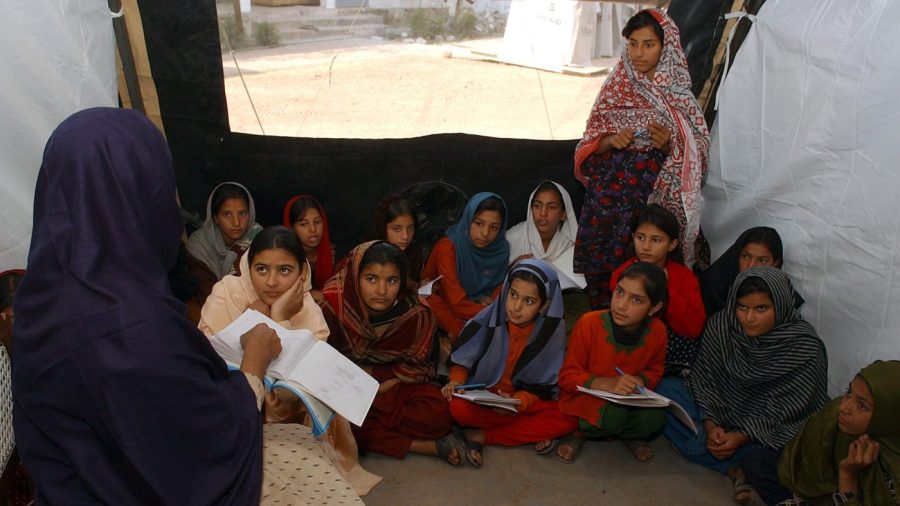
On a brutally hot day in 2007, I was in a helicopter flying across Pakistan. Only two years earlier, a devastating earthquake had caused mass destruction in Kashmir and considerable damage in surrounding regions.
Buildings were toppled. Thousands of lives lost. Children orphaned. Water and electricity were cut off. Now, a bipartisan delegation of members of Congress had come to inspect the recovery.
That’s when I saw a vivid lesson of how projects by USAID keep Americans safer.
The region was a powder keg. As we later learned, terror groups intent on America’s demise were organizing, mobilizing and recruiting in impoverished areas in Pakistan. They were operating in crowded slums and remote areas, indoctrinating the next generation of violent extremism in dark places where young people saw no future.
Once on the ground in the Swat Valley, we were taken to a girls’ school that had recently been rebuilt. I remember seeing a small plaque near the front door, which stated that the school was a gift from the people of the United States of America. It had been funded by USAID.
The building itself was nothing special. It was small and nondescript, with classrooms and an improvised auditorium. Folding chairs had been set up for members of our delegation, teachers and parents. The girls of the elementary school performed songs and dances. Their parents applauded. Flowers were exchanged. It could have taken place in any middle school in my own district on Long Island.
Except that it was a world away, and just might help keep the world safer.
Terrorism requires certain conditions to flourish. It needs the fertile ground of poverty, ignorance, the subjugation of girls and women, hunger, hopelessness. It needs the reflexive acceptance of America as the reason for such conditions, the villain behind all that has gone wrong.
But here, from the rubble of a devastating earthquake that could have been so easily exploited by terror groups, America had built a fortress: a girl’s school. And every day, the students walking through the front door were reminded that it as a gift from the American people.
Thanks to USAID and the American taxpayer, those girls were educated, healthy and resilient. Their community was stronger due to an American commitment to international involvement.
And when bad actors sought to indoctrinate citizens with anti-American hate, they would find it a tougher sell with an audience that knew the country that had built their school was no villain. By investing in these regions — and modestly investing, since USAID’s budget is not even 1 percent of the federal government’s total spending — we were keeping America and the world safer.
It’s called soft power. An affordable, far less risky investment than sending in troops when things go wrong and American national security interests are jeopardized.
Let’s be clear: There isn’t a federal agency that wouldn’t benefit from reform and tight auditing. It makes sense in any organization to ensure that strategic missions are constantly reassessed and even challenged. But a Putin-style storming and seizing of USAID is not only unwise, it is dangerous. It will, in the long run, make areas like the Swat Valley more dangerous, and thus areas like my former congressional district potentially less safe.
At its best, American leadership on the global stage has been characterized by muscular diplomacy that complements military strength with soft power. We use aid incentives not merely to make the world a better place, but also because it makes us safer. Building schools is a safer bet than sending young American soldiers to risk their lives overseas.
Today, our competitors have learned from our historical example. China’s checkbook diplomacy with the Belt and Road Initiative extends to Latin America, Africa, the Middle East and beyond. Our greatest geopolitical foes will step up in the void we leave behind — worsening our long-term security and global influence. The arbitrary USAID decision cedes ground to China and every other major power hoping to overtake the U.S. this century. More dangerously, it cedes the ground to violent groups that feed on misery.
That’s why USAID is an effective tool to promote American security and U.S. foreign policy, enjoying sweeping bipartisan support in Congress and across many administrations. Policymakers who believe in a robust defense and muscular foreign policies understand that a school for girls in the Swat Valley not only benefitted the students. In the long run, it benefited our own security as well.
Steve Israel represented New York in the House of Representatives for eight terms and was chairman of the Democratic Congressional Campaign Committee from 2011 to 2015.











